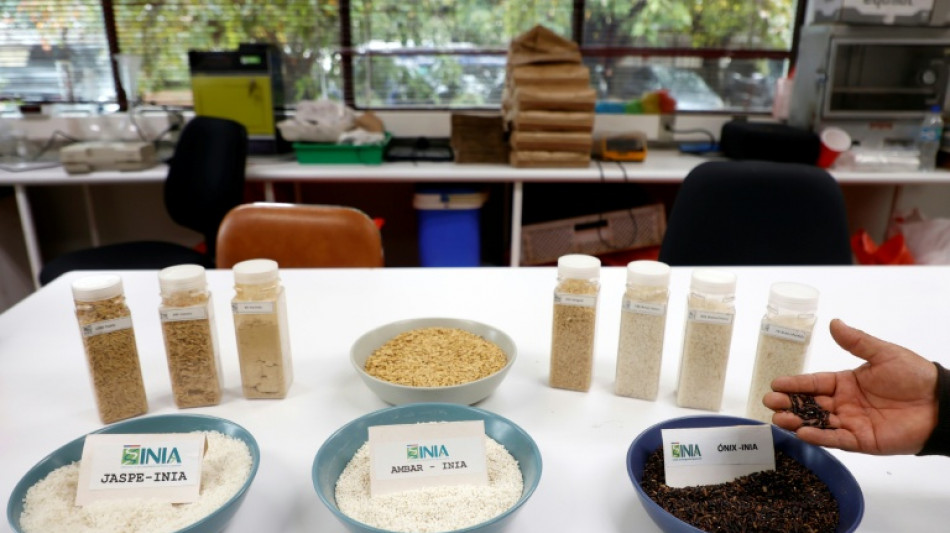
-
 Morocco part company with coach Regragui as World Cup looms
Morocco part company with coach Regragui as World Cup looms
-
Lens beat Lyon on penalties to reach French Cup semis

-
 El Salvador's Bukele holding dozens of political prisoners: rights group
El Salvador's Bukele holding dozens of political prisoners: rights group
-
With Iran war, US goes it alone like never before

-
 Spurs slip deeper into relegation trouble after loss to Palace
Spurs slip deeper into relegation trouble after loss to Palace
-
European, US stocks back in sell-off mode as oil prices surge

-
 Pete Hegseth: Trump's Iran war attack dog
Pete Hegseth: Trump's Iran war attack dog
-
Celtics' Tatum could make injury return on Friday

-
 'Enemy at home': Iranian authorities tighten grip as war rages
'Enemy at home': Iranian authorities tighten grip as war rages
-
Bethell set for 'hell of a career', says England captain Brook

-
 France coach Galthie slams Scotland for 'smallest changing room in the world'
France coach Galthie slams Scotland for 'smallest changing room in the world'
-
Medvedev arrives in Indian Wells after being stranded in Dubai

-
 Trump fires homeland security chief Kristi Noem
Trump fires homeland security chief Kristi Noem
-
Mideast war risks pulling more in as conflict boils over

-
 Wales' James Botham 'sledged' by grandfather Ian Botham after Six Nations error
Wales' James Botham 'sledged' by grandfather Ian Botham after Six Nations error
-
India hero Samson eyes 'one more' big knock in T20 World Cup final

-
 Britney Spears detained on suspicion of driving while intoxicated
Britney Spears detained on suspicion of driving while intoxicated
-
Grooming makes Crufts debut as UK dog show widens offer

-
 Townsend insists Scots' focus solely on France not Six Nations title race
Townsend insists Scots' focus solely on France not Six Nations title race
-
UK sends more fighter jets to Gulf: PM

-
 EU to ban plant-based 'bacon' but veggie 'burgers' survive chop
EU to ban plant-based 'bacon' but veggie 'burgers' survive chop
-
Leagues Cup to hold matches in Mexico for first time

-
 India reach T20 World Cup final after England fail in epic chase
India reach T20 World Cup final after England fail in epic chase
-
Conservative Anglicans press opposition to Church's first woman leader

-
 Iran players sing anthem and salute at Women's Asian Cup
Iran players sing anthem and salute at Women's Asian Cup
-
India beat England in high-scoring T20 World Cup semi-final

-
 Mideast war traps 20,000 seafarers, 15,000 cruise passengers in Gulf
Mideast war traps 20,000 seafarers, 15,000 cruise passengers in Gulf
-
Italy bring back Brex to face England

-
 French policeman to be tried over 2023 killing of teen
French policeman to be tried over 2023 killing of teen
-
Oil prices rise, stocks slide as Middle East war stirs supply concerns

-
 More flights take off despite continued fighting in Middle East
More flights take off despite continued fighting in Middle East
-
Ukraine, Russia free 200 POWs each

-
 Middle East war halts work at WHO's Dubai emergency hub
Middle East war halts work at WHO's Dubai emergency hub
-
Paramount's Ellison vows CNN editorial independence

-
 US says attacks on alleged drug boats have spooked traffickers
US says attacks on alleged drug boats have spooked traffickers
-
Dempsey returns as Scotland shuffle pack for Six Nations clash against France

-
 India pile up 253-7 against England in T20 World Cup semi-final
India pile up 253-7 against England in T20 World Cup semi-final
-
Wary Europeans pledge 'defensive' military aid in Mideast war

-
 Seven countries to boycott Paralympics ceremony over Russia: organisers
Seven countries to boycott Paralympics ceremony over Russia: organisers
-
UK's Crufts dog show opens with growing global appeal

-
 PSG prepare for Chelsea clash with Monaco rematch
PSG prepare for Chelsea clash with Monaco rematch
-
Google opens AI centre as Berlin defends US tech reliance

-
 Second Iranian ship nears Sri Lanka after submarine attack
Second Iranian ship nears Sri Lanka after submarine attack
-
Portugal mourns acclaimed writer Antonio Lobo Antunes

-
 Union loses fight against Tesla at German factory
Union loses fight against Tesla at German factory
-
Wales revel in being the underdogs, says skipper Lake

-
 German school students rally against army recruitment drive
German school students rally against army recruitment drive
-
Wary European states pledge military aid for Cyprus, Gulf

-
 Liverpool injuries frustrating Slot in tough season
Liverpool injuries frustrating Slot in tough season
-
Real Madrid will 'keep fighting' in title race, vows Arbeloa


Less-thirsty rice offers hope in drought-stricken Chile
A cold, dry part of Chile might not sound like the best place to grow rice, a famously thirsty grain that thrives in tropical conditions.
But a new strain of the world's favorite cereal developed by scientists in the drought-plagued South American country has generated hope that rice can be grown in seemingly inhospitable conditions.
Using an innovative planting technique, Javier Munoz has been trialling the "Jaspe" strain created by experts at the Agricultural Research Institute's (INIA) Rice Breeding Program.
It is one of several research efforts worldwide to come up with less resource-hungry crops at a time of increased water scarcity in parts of the world due to global warming.
Using Jaspe in combination with a growing method that requires only intermittent watering cut the Munoz family's water consumption in half in a country that has for generations cultivated rice in flooded fields, or paddies.
At the same time, yield rocketed, with each seed yielding about thirty plants -- nearly ten times more than a conventional rice field.
Irrigating rather than flooding rice fields "is a historic step... towards the future," Munoz, 25, told AFP at his farm in the region of Nuble, a nearly five-hour drive south from the capital Santiago.
Next year, he said, he hoped to increase his production area from one hectare to five.
Chile's Maule and Nuble regions contain the southernmost rice fields in the world.
Typically grown in wetter, tropical areas, rice cultivation in Chile has been hampered by an unprecedented megadrought, now in its 15th year and driven by climate change, according to scientists.
Each Chilean eats on average 10 kilograms (22 pounds) of rice per year -- nearly half of which is grown domestically and 80 percent of that in flooded fields, according to the SRI-Rice research center at Cornell University.
The flooding method, which requires about 2,500 liters (660 gallons) of water per kilogram (2.2 pounds) of rice, is used around the world to combat weeds and regulate the temperature around vulnerable seedlings.
- Less methane -
The Jaspe rice strain was obtained by INIA agricultural engineer Karla Cordero and colleagues by crossing a Chilean seed with a Russian one better adapted to cold and dry climates.
The modified seed is then grown using the SRI growing technique developed in Madagascar in the 1980s that involves spacing the seedlings further apart in enriched soil, and watering only sporadically to build a more resilient root system.
Cordero presented the results of nearly 20 years of experimentation -- conducted with backing from the Inter-American Institute for Cooperation on Agriculture (IICA) -- at an International Rice Research Conference in Manila in 2023.
The findings have yet to be published in a peer-reviewed scientific journal, but Chile's Agriculture and Livestock Service, an arm of the agriculture ministry, gave the green light in 2023 for the new strain of long-grain white rice to be rolled out commercially.
Apart from using less water and fewer seeds, the new Jaspe-SRI method also emits less methane, a potent planet-warming gas more famously produced by cows.
Rice cultivation in flooded paddies crawling with microorganisms is responsible for about 10 percent of human-caused methane emissions, according to the UN's Food and Agriculture Organization.
- 'Climate-smart' -
Jaspe has proven to be more resistant to storms, floods and heatwaves. "The plants are much more robust, which allows rice to be produced without flooding," Cordero said.
Makiko Taguchi, a rice cultivation expert at the UN Food and Agriculture Organization (FAO), told AFP the Chilean work amounted to "a promising approach to improving rice production while reducing the environmental impact."
Pointing to similar work being done in Japan, she said: "Obtaining resistant varieties is one of the main ways to increase resilience to climate change."
Cordero said the results suggested the approach could also work in other parts of the world "where large quantities of rice are produced and where there are droughts."
The team hopes to test Jaspe soon in Brazil -- the largest rice producer in the region -- and in other South American countries.
"This is the future," said Munoz. "If we want... food security and care about the environment, this is the way."
N.Schaad--VB



